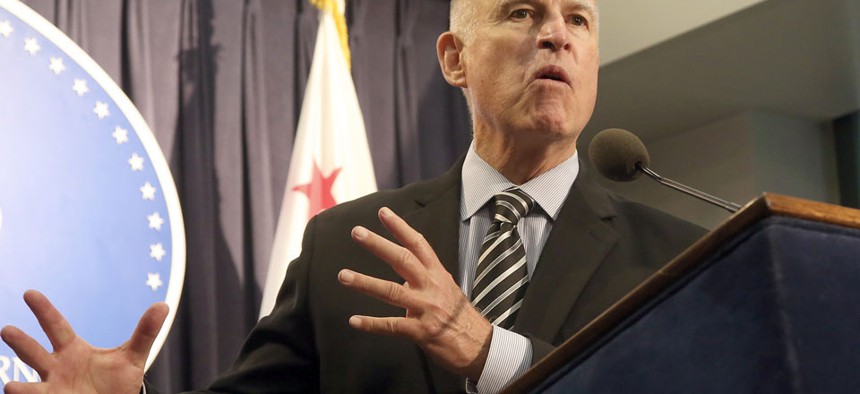States Take the Lead on Sexual-Assault Reform

California Governor Jerry Brown speaks in Los Angeles on Sept. 10. Nick Ut/AP

Connecting state and local government leaders
A movement that began on college campuses is emerging on the national stage.
The conversation about sexual assault on American college campuses has taken on a sense of urgency as it has been elevated to the national level, including through a new White House-sponsored campaign called "It's On Us." But lawmakers in Washington are slow to enact reforms, and states are stepping in to fill the space.
California Gov. Jerry Brown signed a bill on Monday that requires colleges and universities to redefine consent for sexual activities. The law is the first of its kind in the country, but California's is not the only state legislature to take on the issue of sexual assault on college campuses.
Because public colleges and universities receive a large part of their funding from states, not from the federal government, state legislatures have unique leverage over public institutions. Essentially, a state can threaten to cut a university's funding if the university does not follow newly introduced regulations.
In the past year, a number of states have passed laws aimed at sexual assault on college campuses.
Under the California law, every state-funded college and university must educate its students about a new standard of consent known as affirmative consent, which it will begin enforcing immediately. Affirmative consent means that an explicit and voluntary "yes," whether verbal or nonverbal, is required to agree to any sort of sexual activity with a partner. Dubbed "Yes means yes," this policy is a departure from the previous standard of "No means no," under which a sexual advance must be refused outright in order for an encounter to be deemed non-consensual.
A Connecticut bill signed into law this May introduced wide-ranging reforms, requiring colleges to provide certain services and resources to victims of sexual assault, align sexual-assault policy with state-mandated standards, and report incidents of assault to the Connecticut General Assembly.
And new legislation introduced in New Jersey this summer would require colleges to increase transparency surrounding reports of sexual assault and provide victims with a "confidential advocate" for support after the incident. Another New Jersey bill introduced earlier this yearwould slap universities that did not appropriately investigate and respond to students' allegations of sexual assault with fines up of to $50,000.
But in some states, attempts to reform sexual assault policy have found difficulty gaining traction. A proposed Maryland law would have required universities to conduct "campus climate surveys" to determine how frequently and under what circumstances students experience sexual assault. These surveys are a key part of a White House task force's list of recommendations for sexual violence prevention at universities. In the face of opposition from large educational institutions, the Maryland bill died in committee.
And Texas legislation that would have formed a task force to evaluate and reform universities' sexual-assault policies has languished, left untouched since April 2013.
Virginia Gov. Terry McAuliffe avoided the statehouse entirely by forming a task force through an executive order he signed in August. "Listen, I want Virginia to be out front on this issue," McAuliffe told The Washington Post. The state attorney general heads the task force, which will produce a list of recommendations for schools and law-enforcement agencies to reduce sexual assault on campus and better accommodate victims.
Although states are often more nimble than the federal government in addressing these issues, there has been recent activity on the topic in Washington. A bipartisan group of senatorsintroduced a bill in July that would require every school to conduct a climate survey and publish its results, and to offer confidential advisers to victims of assault. Schools that don't comply could be fined a sum up to 1 percent of their operating budgets. The bill, and an identical versionintroduced in the House, are under committee review.
For activist groups such as Know Your IX, which aims to educate students about their rights and advocate for policy changes through grassroots organizing, taking a fight like California's to the national level is still out of reach. "We're totally unfunded and have full-time jobs and educations in addition to our Know Your IX work," says Dana Bolger, a codirector of the organization. "We're definitely interested in working on it in the future."
But until Congress sees national reforms through, sexual-assault legislation is left up to state legislators and governors. Following others' lead, California has shown that a state can shake up the system. Whether other states will pick up on California's momentum remains to be seen.





